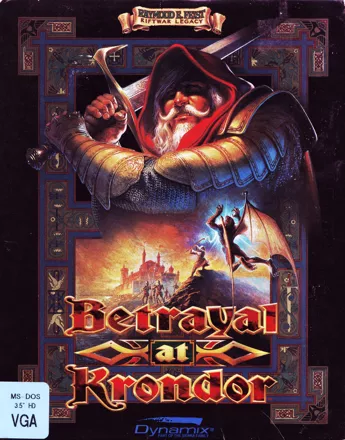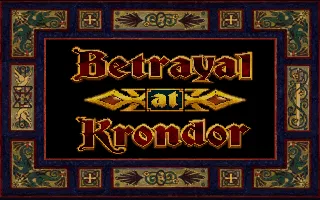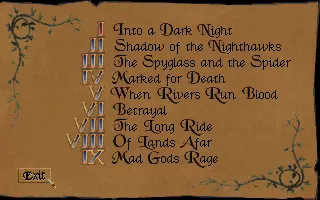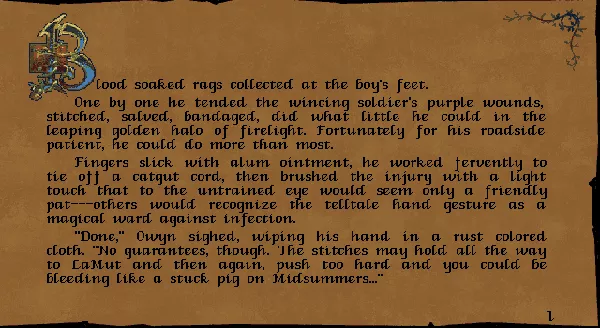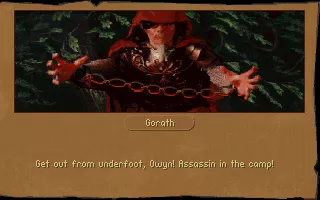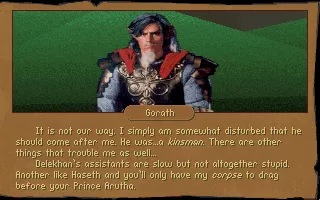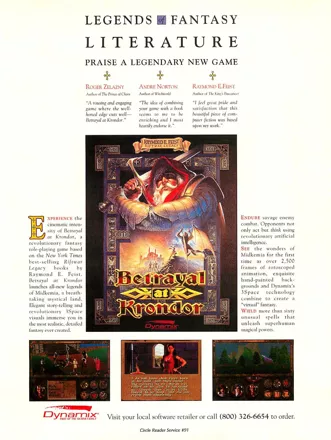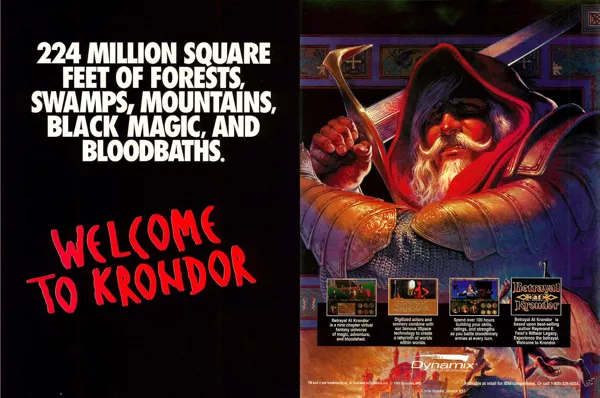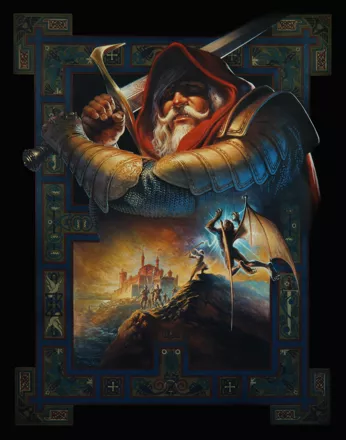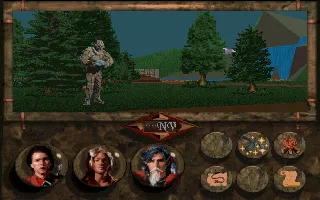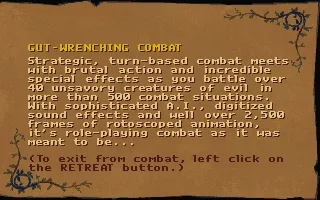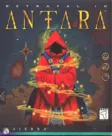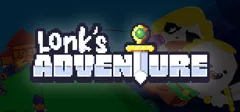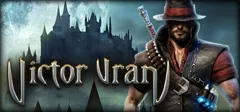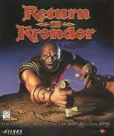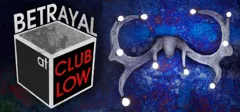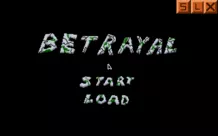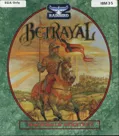Betrayal at Krondor
Description official descriptions
Based on Raymond E. Feist's Riftwar saga (and co-written by Feist himself), Betrayal at Krondor is a medieval fantasy-themed role-playing game set in the Riftwar universe.
The story begins as Gorath, a moredhel (dark elf) renegade, who intended to warn the people of Krondor of the upcoming moredhel invasion, is attacked by an assassin. Locklear, a nobleman who serves the crown of Krondor, and a young magician named Owyn decide to accompany Gorath to Krondor, where they'll have to think of a plan to stop the moredhel leader Delekhan.
The game's story is divided into nine chapters. Each chapter has a goal to achieve before moving on to the next one, but the player is given considerable freedom to explore the vast world of the game and undertake side quests. Gorath, Locklear, and Owyn are the first party of characters the player controls; however, characters may leave and others may join the party later, as dictated by the events of the story.
Exploration in Betrayal at Krondor takes place in a 3D world viewed from first-person perspective. Towns, however, are presented as a series of still screens representing locations (temple, tavern, inn, etc.). Combat takes place on separate grid-based screens. The player moves the characters on these screens in a turn-based fashion, attacking physically, defending, and casting spells.
Only two character classes are present in the game: fighters and magicians. Fighters use swords or crossbows (for long-ranged attacks); magicians can fight with staves, or cast spells. Characters have four attributes: health, strength, speed, and stamina. The latter is depleted when a character uses weapons or casts magic. The role-playing system of the game relies on skills. Each character has a set of skills, ranging from weapon proficiencies to abilities such as bartering or stealth. Skills improve after continuous usage. The player can "emphasize" a skill in order to make it improve faster.
Spellings
- קרונדור - Hebrew spelling
- 叛變克朗多 - Chinese spelling (traditional)
Groups +
Screenshots
Promos
Videos
Add Trailer or Gameplay Video +1 point
See any errors or missing info for this game?
You can submit a correction, contribute trivia, add to a game group, add a related site or alternate title.
Credits (DOS version)
153 People (109 developers, 44 thanks) · View all
| Design | |
| Lead Programming | |
| Programming | |
| Graphics / 3D Programming | |
| Level / Scenario Design | |
| Graphics / Artwork | |
| Music | |
| Art Director | |
| Cover Art | |
| Documentation | |
| Director | |
| Writing / Dialogue / Story | |
| Playtesting | |
| [ full credits ] | |
Reviews
Critics
Average score: 84% (based on 16 ratings)
Players
Average score: 3.9 out of 5 (based on 102 ratings with 12 reviews)
Decent role-playing game with some nasty flaws
The Good
Krondor had some features that were very innovative for its time and I wish more games of today would use. The inventory system was simple and polished, with excellent descriptions for every item that could be found.You could move around using the helpful overhead map and use a yet larger map to see your position in the world.
The world was polygonal with sprites used for objects such as trees. For the time the game was made this was rather good technology, and although it is in no way passable by today's standards, it isn't all that jarring to have to play with.
There are no loading times anywhere in the game as you travel around the world, except when a chapter switches. This is a big bonus-- while loading screens from this era on today's computers would likely blink by in a second anyways, it is far nicer to simply be able to travel about the world unhampered by them.
Combat is fun and has a great system. Instead of the usual battlefield you will see appear in RPGs that don't have real-time combat, the game sets the battlefield as whatever area you encountered enemies on, which makes it seem a lot more realistic. The area is turned into a grid battlefield with the party at one end and the enemies at another.
The Bad
First of all, the artwork comes to mind. Instead of hand-drawn art, which is always the best, the characters appear to have been video captured, which never seems to work with a low-res game such as Krondor. Not only that, but the characters generally look horrible-- wizards look like farmers in bathrobes, knights like farm hands with pots over their heads, etc. It is often painful to have to see a character picture as dialogue progresses.
Furthermore, there are some problems with the game engine. The camera is 'drawn out' from the screen so that it takes two times as long to rotate 360 than it should. You can speed up rotation, but this only makes the effect more dizzying. It's very weird to see what looks like 720 degrees of landscape go by as you turn around.
The game's major strength was supposed to be that it was set in Raymond E. Feist's 'Riftwar Legacy' series. Personally, I am no big fan of his works-- I have read a few books in the series and found them to be devoid of character depth, lacking in intelligent narration, and set in an utterly typical fantasy world. The game is no different. The story for this game is no better than that of any other RPG, and it's no worse than any of Fiest's books-- which I think says a lot about the quality of the series. Enough on that point, however; put simply, the story for this game is nothing special, and I have encountered far better in the likes of Daggerfall.
Another minor issue is that the day passes too fast; one day seems to be equivinant of a natural game hour. If the designers needed it to take longer to get between places, they could have just streched the whole world making it three times as large, or made the character's steps smaller-- the way it is in the final product is totally unreal.
The Bottom Line
Since it was released as freeware by Sierra a long while ago, Krondor is worth the time to find and download. Unless you're a fan of Feist's work, however, don't expect anything special.
DOS · by ShadowShrike (277) · 2003
"Blood soaked rags collected at the boy's feet..."
The Good
Reviewing this game is a challenge for me, as it is one of those games that completely took me by storm while at a young age. For that reason, I thought it might be difficult to give it a fair review, and thus decided to do yet another play-through with a critical glance.
I remember my first experience with this game, sitting with friends on a rainy autumn afternoon in '93 or '94, I can still remember our screams of joy and awe as we walked into a shop in Questor's View and first beheld the Keshian Tapir. I brought the game home with me, and played it for hours and hours and days and (especially) nights.
The thing that most made this such a unique experience for me was the amazing freedom you had to run around and explore. It felt like a proper dice-and-paper-and-gamemaster-RPG. This freedom I had never experienced before in a game, and coupled with an enthralling main story, it created a hold over me very few games before or since has been able to do.
There are an incredible number of sub-quests, lots of areas of the beaten track to explore; lots of weapons to try out and aspire to get your hands on (like the aforementioned Tapir).
The view of the game, the combat system and the character development are all adequate. The graphics are good enough, but doesn't matter that much to me anyway. The music is absolutely fantastic, and creates a good atmosphere.
The world is based on the books of Raymond E. Feist (in my case, the game brought me to the books, rather than the other way around), and is a rich fantasy setting that feels as much as a second home as does Hyrule and Middle Earth.
A special mention must be made of the word-chests. These are chests that require you to solve a riddle in order to get at the treasure inside. In the dark pre-www-days of the nineties, I remember sitting into the early mornings of many a school night, my dictionary in my lap, trying to solve that riddle because you HAD to know what was in the chest.
The Bad
There are of course a few drawbacks:
-A quest log or similar would be very nice. Often, people will not repeat information they have already given you, so if you forget some piece of information, tough. This is mainly concerning the sub quests. When it comes to the main quest though, the game is a bit more helpful.
-Sometimes the perspective makes it very difficult or impossible to access certain objects when two or more objects overlap. After combat, it is sometimes necessary to run around the fallen enemy in circles in order to get the correct perspective that allows you to search all bodies. Other times, if an enemy is dead within a corn-field, attempts to search the body will be interpreted as attempts to harvest the corn, with a resulting "the corn is not ripe and cannot be eaten".
-Sometimes the outcome of a combat is determined by the choices made by the AI. If, for example, you encounter several spellcasters in an ambush, they may have the opportunity to incapacitate your entire party before you are able to act. When this happens, you have no other option than to load the game and try over until the enemy for some reason decides to cast different types of spells. This feels a bit unsatisfactory: you know that the enemy can destroy you if he wants, it feels sort of as if he "let's you win" when you finally succeed.
-The "rest" button in combat has a somewhat strange function when compared to the "camp" button on the map. Resting for a round in combat will restore a couple of hit points, while recovering on the map takes hours of camping and the consumption of rations.
-There is some friction in the flavour between the two great aspects of the game: freedom and story. In the first chapter for example, you are told by the leader of your company to rush to Krondor. But the freedom of the game allows you to run around and doing all sorts of things, like for example spending a fortnight learning to play the lute. The time you spend on sub-quests has no bearing on the main quest, so a bit of "double-think" is required on the part of the player.
-While there is a great array of spells available, in reality there are not that many that are useful, and only a handful will actually be used in most situations. A more even power-level between spells would have made combat more interesting as it would not be so obvious what spell to use.
-The player could have better control of movement in combat. You can only choose the enemy you wish to attack for example, not the square you wish to attack him from. This means that you cannot position yourself tactically between two enemies in order to prevent them from using spells or missile weapons for example.
-Patrus. This magician, joining your party in chapter 5(?), is so incredibly weak you'd actually be better off without him. He is so slow that he will never be able to move until an enemy has closed him down, making it impossible for him to cast spells. His combat stats are also so poor that he often gets himself injured or killed, forcing you to spend time and money healing him. His stealth is also so poor that it is important to ambush enemies and get the initiative. It sort of fits with him being an old man, but it is very annoying. It also feels strange from a story-perspective: Why on earth would the other members of the party go into combat with this old man? Just leave him safe behind a tree or something and call upon him when you need him to translate runes.
The Bottom Line
Despite the few drawbacks (and remember that this time I played actively looking for drawbacks, and that the game is an early example of its kind), this is an absolutely amazing game.
The world is great both in terms of size and quality, the story is good, the freedom to explore fantastic.
It will be on the top 10 list of games, all-time all-formats. I return to the game time and time again, and have done for twenty(!) years. If you enjoy adventuring and exploring in a rich world with a captivating story, this is for you. And be strong: try and solve the puzzle chests without cheating!
DOS · by Dr_Bab (7) · 2013
A very deep, very addicting RPG game. I wish there were more like this.
The Good
I loved this game. The characters and plot are very interesting, for one thing. The whole world that you are immersed in is very complex for a computer game. You really find yourself becoming interested in the fate of the characters. On to gameplay. The management of your resources is a challene in this game. Balancing your budget so that you have enough for bare essentials like food as well as less essential things like a better sword or suit of armor is a very nice touch to the gameplay. It's more realistic and it keeps your mind working when you are not fighting evil hordes. Another plus in the area of management is care of equipment. Once you buy that Dragon Armor, you need to hammer it back into shape after every battle or it won't be much use after a few encounters. Again, it increases the realism and keeps your head constantly busy. As well, you get the classic RPG element of characters talents which can be developed through experience (and through other ways which the smart gamer can find throughout the game). The graphics are very good, especially so for the time it was released, and the sound and music are both appropriate.
The Bad
There are two things I have to criticize. First and foremost, that the 3D first-person navigation is sometimes disorienting and is especially frustrating in puzzles that require you to find a certain item. It can really get you on the edge of your nerves. My second gripe is that searching the dead bodies of your enemies for equipment, while a very essential part of the game experience, can be tedious because you must click on EACH PARTICULAR BODY to see what the enemy has and sometimes the enemies' bodies hide each other.
The Bottom Line
An involving RPG adventure with a deep storyline.
DOS · by Steelysama (82) · 1999
Discussion
| Subject | By | Date |
|---|---|---|
| A flood of nostalgia | St. Martyne (3648) | Mar 1, 2010 |
| CD and Floppy | Unicorn Lynx (181780) | Aug 10, 2009 |
| GameTap | SharkD (425) | Sep 10, 2008 |
| Translating BaK? | Ajan (262) | Jul 6, 2007 |
Trivia
Actors
The actors for the pseudo-video and motion capture don't look remotely like they're described by Raymond E. Feist, and some (such as Pug) are downright contradictory.
CD-ROM version
The CD-ROM enhanced version of the game includes additional goodies: * 5-minute interview with Feist * Windows-based hint system * Redbook audio soundtrack
Freeware release
Sierra has released the game for free as promotion for its two sequels. This offer only lasted for a limited time, though. The version which was obtainable through on the Sierra website was buggy and needed a patch to get it working correctly.
Novel
Raymond E. Feist, the author whose Riftwar books Betrayal at Krondor is based on, has actually written a book based on the game entitled Krondor: The Betrayal, the first part of a new series called The Riftwar Legacy. The book has the same basic plot as the game, but of course has been altered somewhat to fit the format as well as to be more consistent with Feist's Midkemia series as a whole.
Feist does display an interesting knowledge of the game, however. For example, the method by which the villain is ultimately defeated in the book is actually a valid tactic for winning the final battle.
Sales
When the Betrayal at Krondor first came out it did so miserably at sales that Sierra canceled all plans for a sequel. Later, Sierra rereleased the game on CD-Rom and the game suddenly became a huge hit. By that time, however, Raymond E. Feist already had a contract with a different publisher.
Awards
- Computer Gaming World
- June 1994 (Issue #119) – Role-Playing Game of the Year
- February 1996 (Issue #139) – Introduced into the Hall of Fame
- November 1996 (155h anniversary issue) - #43 in the “150 Best Games of All Time” list
- GameStar (Germany)
- Issue 12/1999 - #76 in the "100 Most Important PC Games of the Nineties" ranking
- PC Gamer
- November 1999 - #44 Best Game of All Time
Information also contributed by Alan Chan, Adam Baratz Kalirion, PCGamer77, William Shawn McDonie and WizardX
Analytics
Upgrade to MobyPro to view research rankings!
Related Sites +
-
Alt-Tab: Betrayal at Krondor
Site dedicated to the game, includes various reviews of the game and some downloads. -
Betrayal At Krondor Help Web
All Things BAK. Also has a link to Sierra where you can download the game for free. -
Betrayal at Krondor - FAQs & Guides
Various Guides and FAQs posted on GameFaqs.com -
Mike's Betrayal at Krondor pages
Great resource site for Betrayal at Krondor. -
Official product page of Windows version distributor GOG
Official product page for the Windows version of Betrayal at Krondor - distributed by GOG.com.
Identifiers +
Contribute
Are you familiar with this game? Help document and preserve this entry in video game history! If your contribution is approved, you will earn points and be credited as a contributor.
Contributors to this Entry
Game added by Trixter.
Windows added by Picard.
Additional contributors: Jeanne, Tony Austin, formercontrib, Crawly, Paulus18950, Patrick Bregger.
Game added September 21, 1999. Last modified January 20, 2024.
